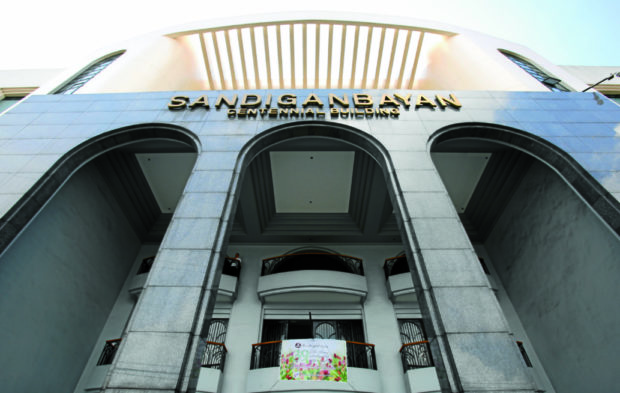Case dismissal via doctrine of ‘inordinate delay’ pains magistrate

Sandiganbayan In Quezon CityINQUIRER PHOTO / NINO JESUS ORBETA
Update
An associate justice at the Sandiganbayan on Friday lamented the dismissal of graft and corruption cases filed before the court over the doctrine of “inordinate delay.”
In a rare move breaking the silence of a magistrate, Associate Justice Efren dela Cruz, who chairs the anti-graft court First Division, said it “pains him” to dismiss cases due to this doctrine, but the hands of the court are tied.
The First Division under Dela Cruz’s chairpersonship has dismissed cases due to this doctrine. This same doctrine is now being questioned by the Ombudsman before the Supreme Court.
READ: Ombudsman wants Sandigan to stop applying ‘inordinate delay’
“It pains us to dismiss cases because of inordinate delay,” Dela Cruz said in his speech during a symposium on the best practices on anti-corruption held at Novotel Manila in Cubao.
Dela Cruz said it is his personal opinion not to dismiss the cases due to inordinate delay, which under the Supreme Court’s latest definition should include the fact-finding investigation.
Under the fact-finding investigation, investigators gather evidence to support the next step of investigation which is the preliminary investigation.
The Sandiganbayan has dismissed cases which took the Ombudsman years to file before the anti-graft court, for violation of the accused’s constitutional right to speedy disposition of case.
The anti-graft court usually accounts for the period starting from the filing of complaint, the fact-finding, the preliminary investigation, until the filing of complaint.
In its motion questioning the doctrine before the Supreme Court, the Ombudsman said the computation for inordinate delay should cover only the preliminary investigation up to the filing of information before the court.
READ: Ombudsman may refile graft cases if SC redefines ‘inordinate delay’
Dela Cruz said he does not agree that the computation for inordinate delay should stretch back to the fact-finding stage.
“Part of the computation of the delay includes the fact-finding investigation. We personally do not agree with that,” Dela Cruz said.
Since this was a doctrine set by jurisprudence, the First Division has no choice but to comply with it, dismissing a spate of corruption cases over the inordinate delay doctrine, Dela Cruz said.
“That’s the doctrine of the Supreme Court. We have no choice but to follow it. It was emphasized that the fact-finding investigation should be made part of the computation,” Dela Cruz said.
“So our hands are tied by the decision of the Supreme Court,” he added.
Among the cases dismissed due to inordinate delay include the graft cases against Zamboanga Del Sur Rep. Aurora Cerilles, Ozamiz City Mayor Reynaldo Parojinog Sr. and Vice Mayor Nova Princess Parojinog, former Bohol governor now Rep. Rene Relampagos and governor Edgardo Chatto, former Government Security Insurance System (GSIS) president Winston Garcia, as well as the fertilizer fund scam cases of former senator Lito Lapid, Masbate governor Antonio Kho, among others.
READ: Ombudsman ‘indulges in self-pity’ over some dismissed cases
Dela Cruz said cases should not be dismissed outright especially because criminal offenses have prescriptive period of 15 years, expressing hope that the inordinate delay would be redefined by the Supreme Court.
“After all, there is what we call prescriptive period of offenses. 15 years! Eh four years pa lang, dini-dismiss na on the grounds of inordinate delay. That is why we are hoping, ha, we are hoping that the decision will be reconsidered,” Dela Cruz said.
Dela Cruz said the latest jurisprudence of the Supreme Court places the duty on the prosecutor to expedite the preliminary investigation.
“Now, this reiterates the precedents in other cases that it is the duty of the prosecutor to expedite the Preliminary investigation. The assertion or non-assertion of the right is immaterial. It is duty of the prosecutor to expedite the Preliminary investigation. Our hands are tied by these decisions of the Supreme Court,” Dela Cruz said.
Dela Cruz shared some tips to the prosecution to prevent their cases from being dismissed due to the inordinate delay doctrine: the prosecution should file a “well-crafted information;” prosecution should “back up its arguments with legal basis and argue well;” the witnesses should be “properly briefed or oriented” by the prosecution on their testimonies; the prosecutor should come to court “adequately prepared;” among others.
Dela Cruz also said the court is adhering with the Revised Supreme Court guidelines on continuous trial, which prohibit motions that unduly delay trial of cases, such as the motion for judicial determination of probable cause, motion for reinvestigation, motion for preliminary investigation, motion to quash information, and motion for bill of particulars, under certain conditions.
Dela Cruz ended his speech by quoting from the lawyers’ code of responsibility: “The primary duty of our lawyers engaged in public prosecution is not to convict, but to see that justice is done.”
In an earlier television interview, Ombudsman Conchita Carpio Morales said she particularly feels sorry about the dismissal by the Sandiganbayan of a graft case against former Bataan Gov. Leonardo Roman over the anomalous 2004 construction of a P3.66-million mini theater, due to the Ombudsman’s unreasonable delays.
The Supreme Court took cognizance of the case when the complainant Enrique Garcia Jr. in 2011 appealed the Ombudsman’s dismissal due to lack of probable cause of Roman’s case. The Supreme Court thus ordered the indictment of Roman, which resulted in the Ombudsman’s filing of the case before the Sandiganbayan in 2015.
But the Sandiganbayan Special Second Division in 2016 dismissed the case due to unreasonable delays that supposedly stretched 11 years, five years of which the Ombudsman took to conclude the preliminary investigation.
While the anti-graft court agreed not to include the period when the case was elevated to the Supreme Court, Morales said part of the delay could also be attributed to the Supreme Court when it tackled the case for four years. JPV
READ: Ex-Bataan gov cleared